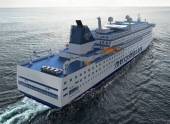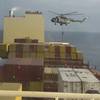Evac's Total Waste Management for Atlantic Mercy
The global cleantech company Evac has been chosen to supply its total waste management system to the world’s largest civilian hospital ship, the Atlantic Mercy.
Owned and operated by the nonprofit Mercy Ships, the ship will provide medical care in the poorest parts of Africa. The vessel is now being constructed by the China Shipbuilding Industry Corporation at the Tianjin Xingang Shipyard.
The contract to supply the vessel was signed in May 2015 for delivery in 2016.
Konstantin Tchetchine, Evac’s Senior Vice President, Marketing and Sales for Asia, says the total waste management system will include 393 vacuum toilets, two vacuum units (type Evac OnlineMax 175), two sewage treatment plants (type Evac MBR 135K), one incinerator, a sludge handling system, a food waste vacuum collecting system, a converter for medical waste, and a thermal sterilizer for wastewater generated by the ship's hospital area.
“All these technologies serve to reduce waste, maximize hygiene, and free up space on the ship for use in accomplishing its primary mission,” says Tchetchine.
“Vacuum toilets require only 1.2 liters of water per flush – six to seven times less than gravity toilets. That means water savings of 52 cubic meters per day for this ship which can carry 950 persons.”
Water savings is especially significant in Africa. “When we flush a toilet we are wasting pure, drinkable water,” says Tchetchine. “And in Africa, pure water is a very precious commodity.”
Also, since vacuum technology is not beholden to gravity, pipes may move in any direction, giving ships’ architects great flexibility in design.
Collected wastewater will be treated by two Evac MBR (Membrane Bioreactor) biological sewage treatment plants. After biological treatment, clean water is separated from biomass by membrane filtration. Membranes work as mechanical barriers to any impurities and stop almost all bacteria and viruses. Due to Evac’s membrane technology, additional disinfection and dechlorination is not needed, creating additional savings.
The total waste management package’s incinerator and equipment for dry waste handling will mean frequency of trips to shore for waste disposal may be decreased, and environmental impact of waste disposal reduced. Evac’s dry waste system also reduces volume of dry waste. Thanks to this technology, a large storage room for waste is not needed on board. This space may then be devoted to medical equipment.
The package’s food waste vacuum collecting system is particularly beneficial in climates like Africa where temperatures can reach 45 degrees Celsius. The Evac system requires a holding tank four times smaller than conventional systems. The Evac food waste system saves 3.3 cubic meters of water per day. The ultimate in hygienic systems, issues usually connected with food disposal such as quick fermentation, smell, and contamination are virtually eliminated.














